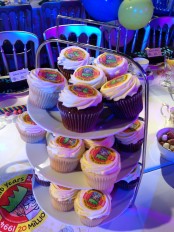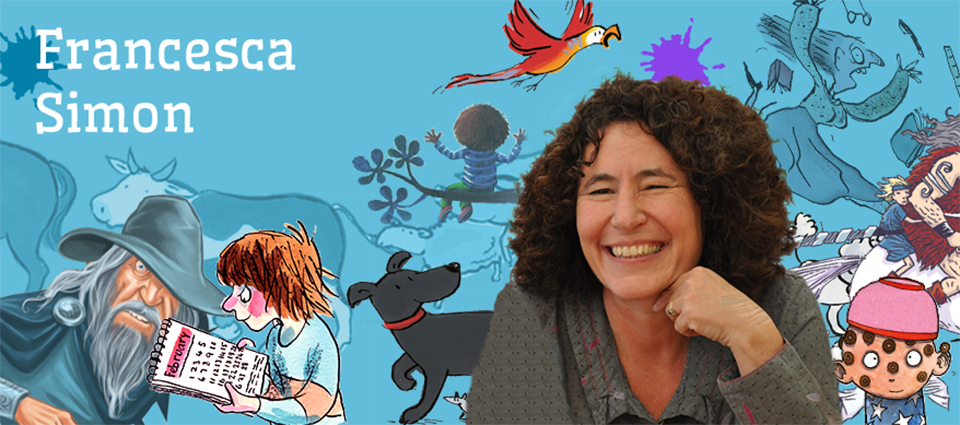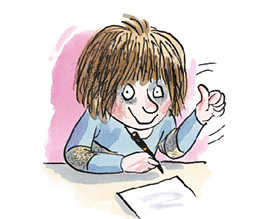 The Imagine Children’s Festival at London’s South Bank Centre opened this week and runs until the 23rd February. Francesca is appearing at two events on Sunday 16th February, one for The Lost Gods with illustrator Adam Stower, and one to celebrate the 20th anniversary of Horrid Henry. The festival was launched this week with a tea party, which included amazing Horrid Henry cakes AND whoopee cushions!
The Imagine Children’s Festival at London’s South Bank Centre opened this week and runs until the 23rd February. Francesca is appearing at two events on Sunday 16th February, one for The Lost Gods with illustrator Adam Stower, and one to celebrate the 20th anniversary of Horrid Henry. The festival was launched this week with a tea party, which included amazing Horrid Henry cakes AND whoopee cushions!
And Francesca made a wonderful speech, which you can read here…
I hope you won’t be too disappointed but I’m going to break with the fine Michael Morpurgo tradition on these occasions and not sing for you this afternoon. Instead I’ll tell you the story about how I learned to ski.
Obviously I’m not athletic—that’s an understatement–but in a moment of madness I went skiing for the first time a few years ago. It was every bit as horrendous as I’d feared. I was black and blue from falling. I was terrified. Every muscle ached, including ones I didn’t know I had. People did this for fun?
As an extra humiliation my son learned in 45 mins, and sped away from the baby pen. My husband learned in two hours, then he was off to the slopes. I remained behind, struggling and failing.
I wanted to give up. But I couldn’t, because my brother had given up his holiday to teach me. I was terrified he would force me to move too fast, that just when I’d finally mastered left hand turns, he’d force me to go straight on to right hand ones. But he was kind, didn’t rush me, and let me enjoy the feeling of accomplishment when I finally mastered a task.
On day four, my last day, I managed a green run. I repeated it all day. I loved skiing down the same run and I refused to move to another.
Struggling to ski gave me great insight into how hard it can be for kids to learn to read, about how scary it is to move on to the next level, how reading for pleasure can seem like a cruel joke.
I write mainly for kids on the cusp, that often invisible age group of 5-8, [the one the Observer doesn’t even review, jumping straight from picture books to 8+] but to my mind the most important, where kids make that crucial transition from learning to read to reading alone for the first time. I love it when parents tell me that Horrid Henry is the first book their child ever read for pleasure. For me, there is no greater compliment.
This is my point: Reading is meant to be fun! And too often it becomes “a learning tool” or a “key stage” or “homework.” Parents often push kids to keep moving on to harder and harder books, before they’ve had a chance to actually enjoy the level they’re at. Or they punish them for learning to read by stopping reading to them. This doesn’t sound like fun to me. There’s a big difference between being able to read, and loving to read.
I believe passionately that kids should read what they want and that kids learn to read in lots of different ways.
My brother, a keen coin collector, learned to read by poring over coin catalogues. My son Josh, who was slow to learn, finally became fluent through Monopoly Chance cards and computer games, because he was convinced we were cheating and wanted to double check. They both found things they WANTED to read, that were important to them, that made it worth the slog.
Our job as authors is to write books we are passionate about, for children to discover and to enjoy. Having access to books is the birthright of every child, and as people who are passionate about literacy, we have to speak out against library cuts and library closures. Especially when The Bookseller reported this week that 30% of London children grow up in homes without any books. We also have to speak out against people [no names but their initials are Michael Gove] insisting there’s one right way to learn to read, which is quite frankly, absurd.
And since this is a rare chance to speak to the assembled great and good of children’s publishing, can I respectfully urge you all to give your writers a chance to find their stride? People often assume that Horrid Henry was an instant hit, but Horrid Henry wasn’t even in Waterstones until book 4—that’s four years after I started writing them. Independent book shops and teachers discovered the books. If Orion had abided by the ‘2 strikes and you’re out’ rule, I certainly wouldn’t be speaking to you today (I’d probably be teaching skiing.) Bold and imaginative writers need bold and imaginative publishers willing to take chances, so that we can all play our part in inspiring young readers.
Which is one of the many reasons I love the Imagine Festival. I love the engaged and packed audiences, the eager questions, and the party atmosphere which gets kids excited about books and reading.
I raise my glass to you all, my fellow authors, publishers, and book people, and thank you for the privilege of having played my part in introducing a generation to the great joy and pleasure of books.

